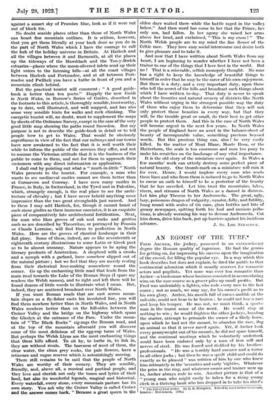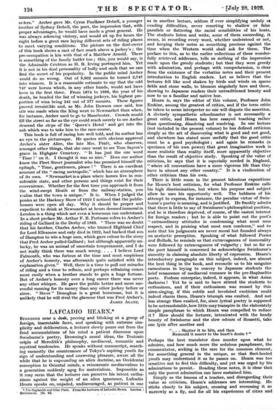AN EGOIST OF THE TURF.*
FRED ARCHER, the jockey, possessed in an extraordinary degree the Roman quality of ingenium. He had the genius for getting on, for impressing his success upon the imagination of the crowd, for filling the popular eye. In a way which this book describes but does not explain, lie fired the public to that sentimental adoration which it usually reserves for ronuintic actors and pugilists. Yet none was ever less romantic than Archer—a tradesman whose business consisted in accumulating wins on the race-course as a grocer piles up small profits. But Fred was undeniably a fighter, who rode every race to the last ounce ; not so much, we may say, for his owner's profit as to his own glory. Archer, his mouth full of curses audible at the rail-side, could not bear to be beaten ; he could not lose a race and keep his temper. He was not, we must think, a sports- man in the truest sense of the word. He would stop at nothing to win ; he would frighten the other jockeys, humbug the starter, attempt to persuade the owner of a likely horse, upon which he had not the mount, to abandon the race, flog an animal so that it never raced again. Yet, if Archer took every pennyweight out of his mounts, he did not spare himself, and the continual wastings which he voluntarily undertook could have been endured only by a man of iron will and nerves of steel. He was feared and disliked by his brother- professionals. " He was a terribly hard swearer and a terror to all other jocks ; but then he was a spoilt child and could do exactly as he pleased " was written of him by one who knew him intimately in the 'seventies and early 'eighties. Whatever the price in the ring, and whatever owner and trainer were up to, Archer always rode to win. Another picture is that of a "young man who might easily be taken for a rising young clerk in a thriving bank who has dropped in to take his chief's
• Tim Life of Fred Archer. By E. Si, Hompirbi. Edited by Lord Arthur Grosvenor, London : Hutehlason. L188.1 orders." Archer gave Mr. Cyrus Faulkner Dobell, a younger brother of Sydney Dobell, the poet, the impression that, with proper advantages, he would have made a great general. He was always scheming victory, and would sit up for hours the night before a great race laying different sets of riding places to meet varying conditions. The picture on the dust-cover of this book shows a cast of face much above a jockey's ; the pre-occupation is kin with that of a Matthew Arnold. There is something of the family butler too ; this, you would say, is the Admirable Crichton as H. B. Irving portrayed him. Yet it is not in his dual personality of bully and snob that we can find the secret of his popularity. In the public mind Archer could do no wrong. Out of 8,802 mounts he turned 2,747 into whiners. It is a reasonable estimate to say that the odd 747 were horses which, in any other hands, would not have been in the first three. From 1874 to 1886, the year of his death, he headed the list of winning jockeys, his highest pro- portion of wins being 241 out of 577 mounts. These figures proved irresistible and, as Mr. John Dawson once said, less stir was made when the King went to Newmarket than when, for instance, Archer used to go to Manchester. Crowds would till the street as far as the eye could reach merely to see Archer descend the steps of the ` Queen's Hotel' and get into the cab which was to take him to the race-course. This book is full of racing lore well told, and its author has an eye to the picturesque. He quotes with obvious approval Archer's sister Alice, the late Mrs. Pratt, who observes, amongst other things, that she once went to see Tom Sayers's grave in Highgate Cemetery. " It has just the one word ' Time ! ' on it. I thought it was so nice." Does our author know the Fleet Street journalist who has promised himself the epitaph, " Time, gentlemen, please ! " There is an excellent account of the " racing metropolis," which has an atmosphere of its own. " Newmarket is a place where horses live in con- siderable state, and other persons and things exist for their convenience. Whether for the first time you approach it from the wind-swept Heath or from the railway-station, you realize that the town is unique." It is. When I judged the ponies at the Hackney Show of 1919 I noticed that the public- houses were open all day. Why it should be proper and expedient to drink at Newmarket at hours deemed immoral in London is a thing which not even a horseman can understand. In a short preface Mr. Arthur F. B. Portman refers to Archer's riding of Galliard in the Derby of 1883. " There was no doubt that his brother, Charles Archer, who trained Highland Chief for Lord Ellesmere and only died in 1922, had backed that son of Hampton to win a huge sum, which gave colour to the story that Fred Archer pulled Gaillard ; but although apparently un- lucky, he was an animal of uncertain temperament, and I do not 'really think there was much wrong. . . . I believe Lord Falmouth, who was furious at the time and most suspicious of Archer's honesty, was afterwards quite satisfied with the explanation given." Well, there is a time to pull out miracles of riding and a time to refrain, and perhaps refraining comes more easily when a brother stands to gain a huge fortune. But of Archer's honesty over a long career there was never any other whisper. He gave the public better and more suc- cessful running for its money than any other jockey before or since. " Steve " Donoghue is a great horseman, but it is unlikely that he will rival the glamour that was Fred Archer's.
JAMES AGATE.







































 Previous page
Previous page